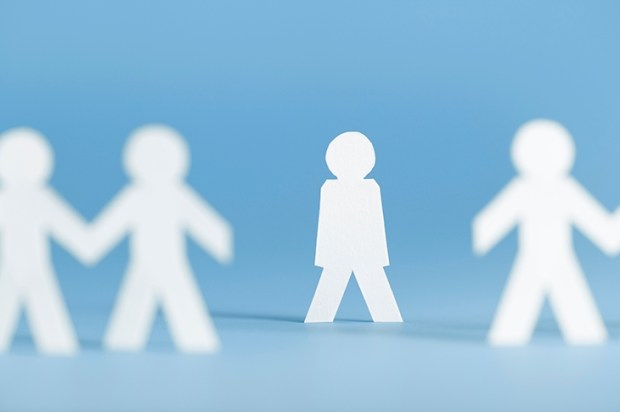In another blow for freedom and the protection of the vulnerable, Conservative MP Mark Spencer has suggested that anti-terror legislation should be used to punish teachers who hold ‘old-fashioned’ views about homosexuality and perhaps divest themselves of these views to their pupils. I assume this could mean simply reading out bits of the Bible — that pungent little verse in Leviticus, perhaps, with its reference to ‘detestable acts’. Or maybe he would be OK reading out bits from Leviticus if he then made it clear that the Levite priests, and God Himself, were totally wrong on this issue and that homosexuality is absolutely lovely.
But never mind the Levites. These ‘old-fashioned’ views would include doubting the legitimacy of gay marriage and might incur an ‘Extremism Disruption Order’, according to the Nottinghamshire MP whose incandescent brilliance first came to light when he won the coveted ‘2011 Brake Road Safety Parliamentarian of the Year Award’.
So this is where we are. To be caught in the possession of one or two doubts about gay marriage is enough to label one an extremist — and (cue Carlos Santana playing ‘Samba Pa Ti’) not just any old extremist, but a Mark Spencer MP extremist. I think there is a difference between having doubts, rooted in the Christian faith, about gay marriage and pushing homosexuals to their deaths off tall buildings — but to Mark, they’re apparently one and the same thing. These days even the mildest dissenting view — even a mildly dissenting view held by the majority or a large minority of the population — is extremism. This is the new absolutism at work.
Long before Mr Spencer impinged himself upon the public consciousness, I think we all knew that Ted Heath was a poof. I use the term that would have been commonly applied during his spectacularly awful period in the highest of offices, by the way. The word ‘gay’ had not, by February 1974, completed its transformation in the British consciousness — it was in a sort of halfway house by then, sort of like those transgendered folk who have had their breasts stapled on but have not yet got around to slicing off their old fellas. ‘Poof’ or ‘queer’ were the descriptions du jour, along with more puzzling pejoratives relating to nine-bob notes and butcher’s hooks.
I suppose there would have been some naive and sheltered souls who thought that Prime Minister Heath’s organ-playing was a sad and solitary pursuit, rather than a thoroughly collegiate experience (ladies not invited). And probably many more besides who, out of expediency, just did not give it a moment’s thought. But his gender preference was pretty clear, really. It was all there in the coded references of that less worldly time — ‘confirmed bachelor’, which always meant ‘poof’. That Sir Edward’s sexual preferences needed to be shrouded in secrecy is, I suppose, an indictment of those times. If he had been ‘out’ when he turned up for his first selection meeting in Bexley, in 1949, I think it is fair to say that he would not have got the nomination. He would have been booted out with precisely the same rapidity as if today a candidate of any of the four main parties — Con, Lab, Lib Dem, Pict — dared to proclaim themselves homophobic.
The laws of the land change; I am lucky enough to have enjoyed my youth during that brief, liberal interregnum where neither homosexuality nor homophobia were illegal. Do what you want, think what you want — it did not last terribly long, that concept.
But a pederast? Well — frankly, yep, maybe. I have to say that the allegations against Sir Edward didn’t shock me to my boots and I don’t suppose they shocked you either. The consequence of a certain prejudice, I would guess, even if it is the sort of prejudice we school ourselves to expunge. They are very serious allegations against Heath: two counts of child abuse, with several police forces investigating. But of course nothing has been proved. Nothing has been proved in the case of the former Home Secretary and European Commissioner Sir Leon Brittan, either, but if you had asked me to name one politician from the last 40 years who might have indulged in a bit of kiddie-fiddling, ‘Sir Leon Brittan’ would have been my immediate and jubilant response. Oh, apart from maybe the utterly loathsome Cyril Smith. Sir Peter Morrison, meanwhile, never really featured on my radar: he is the exception which proves the rule.
They are all dead, these people. So you can argue it one of two ways: it is easier to make accusations against them because they cannot respond or they are now comfort-ably beyond the reach of the law, having hitherto been protected by the establishment. I would tend to the latter argument.
I knew all along, then! About Ted and Leon and Cyril — and Jimmy, for that matter. This is not entirely hindsight, although I daresay hindsight might have intruded of late. Nor do I really mean that I ‘knew’ — that I knew properly or had anything other than, hell, a mistrust of those people and a visceral misgiving. A while back my colleague Hugo Rifkind wrote a very good and typically thoughtful piece for the Times which suggested that ‘Eeeeuw!’ was not sufficient as a response to the gay marriage debate — that as an argument against it did not quite win the day, or indeed come anywhere close. He was right then, I think.
But there is nonetheless a case for ‘Eeeeuw’, isn’t there? Tell me that when you looked at Jimmy Savile, Sir Ted, or Rolf Harris, or Sir Leon Brittan, you didn’t inwardly shudder and think: ‘Eeeeuw!’ Back in the day, when they had tenure, when they were on the TV all the time, pontificating or grandstanding — was there not something a little creepy, sexually, about them? We are taught, these days, to discount our immediate reactions to another person as being superficial and based upon a whole bunch of signifiers — prejudice, in other words. But those instinctive responses are often right, are they not?
Got something to add? Join the discussion and comment below.
Get 10 issues for just $10
Subscribe to The Spectator Australia today for the next 10 magazine issues, plus full online access, for just $10.















Comments
Don't miss out
Join the conversation with other Spectator Australia readers. Subscribe to leave a comment.
SUBSCRIBEAlready a subscriber? Log in